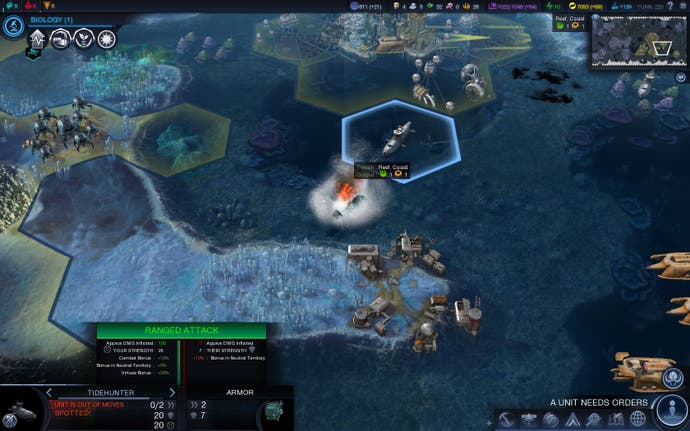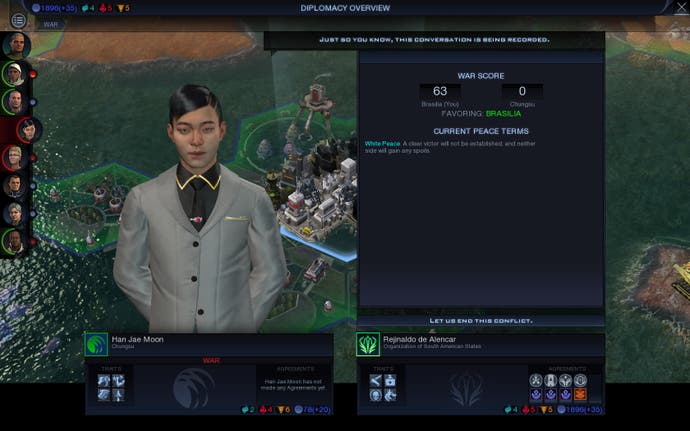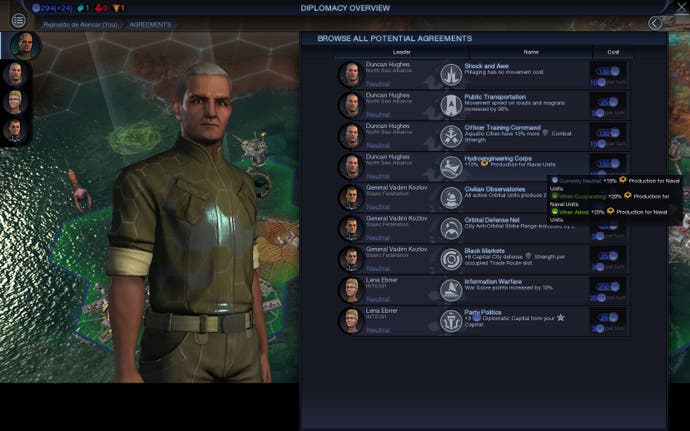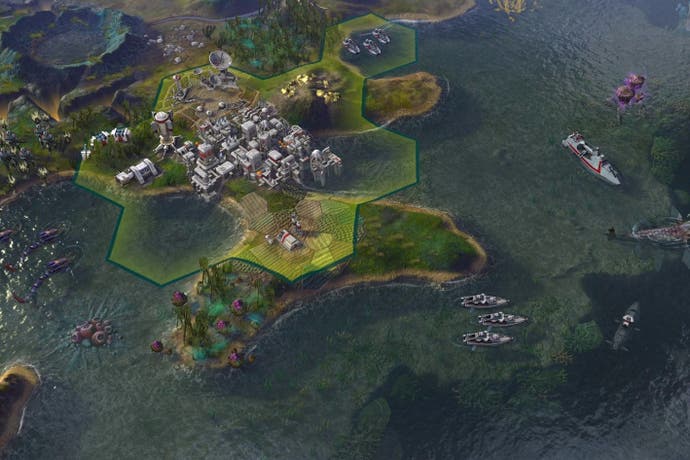Civilization: Beyond Earth - Rising Tide is generous, imaginative, and currently a bit broken
Splashdown.
Editor's note: Since this article was published, a hotfix for the buggy diplomacy system has been released. We will examine it in detail soon.
Civilization: Beyond Earth's first expansion is typically broad-ranging, covering a big new feature, a few additional toys, and a measured recalibration of an existing system. It's inventive, it's often transformative - and, at present, it's also a little bit broken. Play the current code for any serious length of time and you'll find what strikes me as a pretty major bug lurking near the heart of the game's reworking of diplomacy mechanics. I've been in contact with 2K about this, and they've confirmed that the game isn't working properly at present but that a fix is on the way. I want to be clear up-front: this is not a game-breaking problem - and I'm going to explain it as best as I can in a few moments - but it does mean that the results of some of Rising Tide's most interesting ambitions are impossible to honestly comprehend for the time being (which is why we don't feel able to call this article our final review).
For now, though, let's look at the wider package, starting with that headline new feature. Rising Tide offers a huge map-level twist to Firaxis' planet-conquering strategy game by allowing players to build aquatic cities, thus bringing the game's vast oceans more clearly into focus. Aquatic cities are unlocked early on in the tech web - although some civs start with them ready to go - and they're a little different to land-based settlements. On the downside, they're weaker, which makes sense when you picture a bunch of skyscrapers wibbling about on inter-connected dinghies. On the upside, though, rather than relying on traditional means of expansion, you can choose to move them around, gaining new territory in a sort of sluglike fashion, leaving a lengthy trail of urban development behind you. Lovely!
Moving cities about is handled by a selection in the production menu, which means that when you're making waves you can't be building anything else. It also allows for new strategies in terms of area denial that I'm still starting to get my head around. Early on, the compulsion to move comes from the fact that there are resources lurking nearby that you wouldn't mind getting a worker to have a look at. In the late game, though, and if I'm chugging towards a tricky victory while the rest of the planet decides it's time to give me a shoeing, I've started using them to run interference, to make it trickier - and more expensive - for anyone to get to my true heartlands.
Aquatic cities are brilliant, then, and rather than fundamentally alter the basic Beyond Earth structure, they add a bunch of new options - and a lot of potential headaches as you deal with ambitious neighbours. This is how an expansion should work!
Onto the additional toys. Firstly, Rising Tide offers two new biomes to choose from when selecting a planet to play on. Frigid biomes are frozen wastes of ice and snow, where the oceans and mountains are filled with ancient aliens who tend to move slowly and stick together in packs. Primordial biomes turn that on its head rather neatly: landscapes of deep rents and freshly-cooled rock where the wildlife is primitive, but plentiful and jittery.

When it comes to new civs, there are four to pick between, and they specialise, rather loosely, in diplomacy, commerce, espionage and watery stuff. The last two are the most immediately interesting, if you ask me: Chungsu starts with a covert agent ready to go - which means that you can be spying on people before there's actually anybody to spy on - and also gives you bonuses for agents in foreign cities. I've played a handful of Chungsu games, one of which went memorably awry, and it's definitely interesting to be thinking about the sub rosa elements from the off. The North Sea Alliance, meanwhile, benefits from aquatic cities that are stronger and cheaper, and has also become an early favourite. It helps that its leader, Duncan Hughes, is a puddingy splice of both Robson and Jerome squished into a single wetsuit, and that his backstory finds room to mention an extraordinarily large fish he once caught.
Beyond that comes a change to the affinities system that allows you to specialise in more than one, blending elements of harmony and supremacy, say, to create weird new mutant units.
These units themselves are often brilliant. The Golem, for example, is a purity/supremacy robot monster that stomps around like a HULK from Robotron, dealing damage but also acting as a portable wall on the battlefield. The Immortal is purity/harmony - I'm clearly big on purity - and comes across as a gold-painted genetic badass who ignores terrain cost and messes up its foes with a certain Dr Manhattan flair for the imperious. There are a bunch of these sorts of things, and they're all fun to unlock. More than any individual new toy, though, the ability to combine affinities simply makes each visit to the tech web even more like a trip to the world's nastiest supermarket. With its angry wildlife and its array of costly treats like Swarm Intelligence and Vertical Farming, Beyond Earth really is a game about gardening and shopping at times, and it's fascinating to have a little more to think about in terms of affinities bonuses when choosing which technologies to pick up next.
Lastly, in terms of additions, comes my favourite: artefacts. Artefacts are new collectables that are scattered around the map, waiting for your early-game legions of explorers to stumble across. Once unearthed, they can either be cashed in immediately for a slight resource boost, or they can be lumped together in groups of threes, at which point you'll also get something really special - a new unit or building, say, unlocked well before its time. This is a nice enough idea, but it's the mixing and matching I really like, as you recombine artefacts to see what the best outcome you can get is. There's something of the sugar rush of that old berry-blending idea in Pokémon, and it's particularly welcome in a game like this. More than anything, Beyond Earth is all about sending you to live on a planet that would really like to turn you into dust. It's a delight to see that balanced in such a playful way with a cheery sort of capsule-toy approach.

Now we're onto the final element, the overhaul of diplomacy and the whole process of building a character for your own civilisation. Here's where it gets tricky - and in truth, that's not just because of the bug. The original Beyond Earth stayed very close to the diplomacy system for Civ 5, and as such it inherited a lot of Civ 5's quirks: complex AI that was taking in so many variables and presumably making so many micro-decisions that its actions could look crazy, or even random. Rising Tide offers sweeping changes, and they all hinge on one thing, really: a lunge at clarity. This is a game that wants to give you the tools to understand how you appear to the other Civs, and what they in turn are looking for in you when they make their decisions.
At the forefront of this is a system that allows you to buy and upgrade basic character traits, of which you can have up to four at any time. These traits offer perks - the progressive trait sees you gaining health for making agreements with over civs, for example, while the defensive trait gives you a combat boost in friendly territory - but more important than that, they allow you to create an image of yourself which you can compare to other civs, all of which have their own traits which explain the kind of things they like to see in a rival. In my last game, Chungsu got on with me because I too valued spy networks, while INTEGR thought I was useless because my army was weak. These sort of things have always driven AI decisions, I assume, but suddenly it's much easier to see the wheels go round.
And it's much easier to play with. Traits are purchased with diplomatic capital, a new currency - as if Civ needed another - that is earned from, amongst other things, agreements with fellow civs, and as well as upgrading traits you can swap them in and out dynamically, buying a new personality to become the hero that your rivals want to know. It's strange, but maybe it's honest: maybe global politics really is about managing your Match.com profile. The crucial thing is that, artificial as it is, Civ's finally found a way to make everything clear to the player, with traits backed up by a new Respect system, which shows you in numerical form how much a rival civ likes the load-out you currently have, while Fear indicates what they make of your relative strength.
So far, so good. Or mostly so good, at any rate - inevitably civs still do strange things now and again which don't seem to tie into either their levels of fear or respect for you. (Sometimes, they flat out don't make sense. "You're not planning on using that military of yours on little old me?" asks Lena Ebner of INTEGR all of a sudden the other day. Ebner, mate, I've been at war with you for the last hour.)
Now things get shaky, though. Partly because the new agreements that your traits unlock are a little inflexible compared to the old system - you're basically offering diplomatic capital in exchange for a regular bonus in something else, or vice versa, but there's no way to change the values being pitched - and partly because there's this bug in the current build.
The bug is to do with going to war. In old Civ games, you could just ask another civ if they wanted to join you in ganging up on a third: playground tactics, to quote the diplomats of Jurassic 5. That option isn't available any more, and I suspect it's because the designers want to automate things slightly and make them a bit cleaner and more reliable. The idea now is that you can change your relationship with a civ, ranging from being at war to being allies, and now this relationship controls what happens when one of you goes to war.

In other words, if I'm allies with INTEGR and they go to war with the North Sea Alliance, I suddenly find myself dragged in too. This is bewildering enough in itself, but it's compounded at present by a bug that means it doesn't seem to work in reverse: ie, if I want to go to war with the North Sea Alliance and I'm allies with INTEGR, they don't seem to feel the need to join me.
I've been talking to 2K about this bug, and I've been unable at present to get an ETA on a patch. The current quote I have is: "Firaxis is working on getting this fixed." I gather it will appear as a known issue on the website and a patch should be on the way swiftly. My workaround so far is simply not to go into alliance with anyone - and in truth, I think this gets at a problem that goes deeper than the bug anyway. Old Civ diplomacy could be confusing, but it was also flexible. Here, I've spent a lot of time being yoinked into wars I didn't even know were brewing.
It's hard, as of yet, to get a sense of how successful the reimagining of diplomacy is, in other words. Traits are definitely a step in the right direction, while the alliances business and the inflexibility of agreements feel like ideas that require a little more time to bed in. Also in the mix is a new War Score system, which seeks to make settling up after a battle a lot easier by keeping a running total throughout the skirmish so you always know who's ahead, who's behind, and what the reparations are going to come to. Part of the fun of Civ was always making audacious and sometimes disgusting peace term offerings. That's gone now. Clearer, for sure, but again less flexible, at least as I understand it.
The ultimate question - and happily, I think it's a really interesting one - is: what does the AI bring to the game in the first place? What is the real purpose of the other civs in Civ? I suspect that there are almost as many answers to this as there are players by this point. Me? As a witless but enthusiastic ruler, I'm happy to admit that I've long since lapsed into playing Civ as a kind of strategy roguelike - like American Football played out on a grand global stage. It's me going after the victories, and the other civs combine with the procedural map to create a kind of restless and ever-shifting defensive line, blocking me from touchdown. In my case then, even broken as it currently is, I can still get a good game out of Rising Tide, because all I'm looking for is regular opposition, for a source of nasty surprises.
But I am aware that I'm probably playing Civ wrong, and that for many people it's a lot more cerebral than that. It's not just about the winning, it's about the beating - about reading opponents, outsmarting them, and even making sense of their strangest decisions. These are the people who are going to find Rising Tide maddening. And I suspect they still will after the bug is squished.









